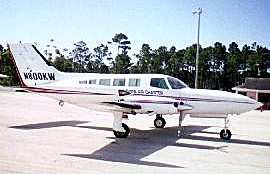Is This Another Move To "Out" Unsafe Fliers?
 The National Transportation Safety
Board today determined that the probable cause of the fatal
ditching of a commuter airplane off Great Abaco Island, Bahamas,
last year was "the in-flight failure of the right engine and the
pilot's failure to adequately manage the airplane's performance
after the engine failed."
The National Transportation Safety
Board today determined that the probable cause of the fatal
ditching of a commuter airplane off Great Abaco Island, Bahamas,
last year was "the in-flight failure of the right engine and the
pilot's failure to adequately manage the airplane's performance
after the engine failed."
The Board said the engine failure resulted from "inadequate
maintenance" that was performed by the operator's maintenance
personnel during "undocumented maintenance."
The accident airplane, a Cessna 402C, operated by Air Sunshine,
Inc., was on a scheduled flight from Ft. Lauderdale (FL), on July
13, 2003, carrying a pilot and nine passengers, when it experienced
a right engine failure and was ditched in the Atlantic Ocean about
7 nautical miles from Treasure Cay Airport. Two passengers, 33-year
old Diane Parker-Diaz of Jacksonville (FL) and her four-year old
niece, Diante Wayna Parker, died after they evacuated the airplane.
Five other passengers including Parker-Diaz's son and daughter, and
a couple who held their 15-month old baby above their hands as they
floated in the Atlantic for 90-minutes, waiting to be rescued.
They, along with the 45-year old pilot, identified as Hassan
Moslemi of Fort Lauderdale, sustained minor injuries. The airplane
was substantially damaged.
 "This was an egregious and
preventable accident that raises many safety issues that need to be
addressed," said NTSB Chairman Ellen Engleman Conners. "It also was
a clearly survivable accident -- as are most commercial air carrier
accidents, and points up the necessity of strictly following
time-tested procedures to maximize passenger safety in emergency
situations."
"This was an egregious and
preventable accident that raises many safety issues that need to be
addressed," said NTSB Chairman Ellen Engleman Conners. "It also was
a clearly survivable accident -- as are most commercial air carrier
accidents, and points up the necessity of strictly following
time-tested procedures to maximize passenger safety in emergency
situations."
The Board found that the right engine failed while the airplane
was descending through an altitude of about 3,500 feet. Two or more
of the right engine No. 2 cylinder hold-down nuts became loose,
which resulted in high-stress fatigue fractures that allowed the
cylinder to separate from the engine. The simultaneous loosening of
two or more of the cylinder hold-down nuts, the Board said, was due
to the "application of insufficient torque" applied by Air Sunshine
personnel during maintenance work that was not documented. The
Board stated that, at the time of the accident, Air Sunshine's
maintenance record-keeping and practices were not adequate.
The Board also found that the pilot had a history of
below-average proficiency before the accident flight, including
numerous failed FAA flight tests, that contributed to his inability
to maintain maximum flight performance to reach land when the right
engine was lost.
Additionally, after determining that he was going to ditch the
airplane, the pilot failed to conduct a required briefing for the
passengers on emergency procedures, including the correct use of
personal flotation devices. This failure, the Board said,
contributed to passenger fatalities.
 Contrary to federal regulations, the
pilot also did not have his shoulder harness fastened when the
airplane hit the water and, consequently, sustained a head injury
that reduced his ability to assist the passengers after the
ditching.
Contrary to federal regulations, the
pilot also did not have his shoulder harness fastened when the
airplane hit the water and, consequently, sustained a head injury
that reduced his ability to assist the passengers after the
ditching.
Board Members also expressed concern about the role of the
Federal Aviation Administration in this accident, noting that
although FAA oversight of the air carrier was in accordance with
standard guidelines, it was not sufficient to detect maintenance
deficiencies at Air Sunshine.
The Board recommended that the FAA issue a bulletin informing
inspectors overseeing Part 135 single-pilot operators about the
circumstances of the Air Sunshine accident and emphasizing the need
for pilots to provide timely emergency briefings.
On a provisional basis, the Board adopted the accident
investigation report, subject to revisions to the text and
consideration of additional safety recommendations focused on
issues of maintenance, pilot proficiency, and regulatory
oversight.
The highly unusual NTSB report came just days
after members of the ICAO, meeting in Toronto, indicated they will
start "outing" air operators that flout safety, maintenance and
training standards. The international
organization said far too many countries weren't tough enough on --
or even ignored -- such lapses.
 ANN's Daily Aero-Term (04.26.24): DETRESFA (Distress Phrase)
ANN's Daily Aero-Term (04.26.24): DETRESFA (Distress Phrase) ANN's Daily Aero-Linx (04.26.24)
ANN's Daily Aero-Linx (04.26.24) Airborne 04.22.24: Rotor X Worsens, Airport Fees 4 FNB?, USMC Drone Pilot
Airborne 04.22.24: Rotor X Worsens, Airport Fees 4 FNB?, USMC Drone Pilot Airborne 04.24.24: INTEGRAL E, Elixir USA, M700 RVSM
Airborne 04.24.24: INTEGRAL E, Elixir USA, M700 RVSM Airborne-NextGen 04.23.24: UAVOS UVH 170, magni650 Engine, World eVTOL Directory
Airborne-NextGen 04.23.24: UAVOS UVH 170, magni650 Engine, World eVTOL Directory





